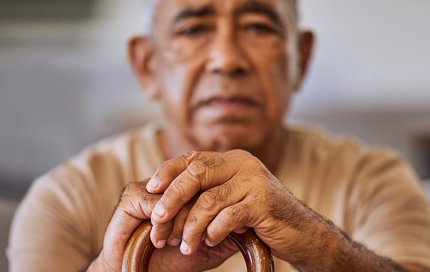Skin Test Detects Evidence of Parkinson’s

Photo: PEOPLEIMAGES.COM-YURI A/SHUTTERSTOCK
A research team led by Dr. Christopher Gibbons of Beth Israel Deaconess Medical Center has been working to identify accessible biomarkers that could help diagnose Parkinson’s disease and other neurodegenerative disorders.
Alpha-synuclein is a protein found in brain and nerve cells. When an abnormal form of this protein accumulates in the brain and nervous system, it can lead to serious neurodegenerative disorders. Of these disorders, collectively known as synucleinopathies, Parkinson’s disease is the most common. Others include dementia with Lewy bodies, multiple system atrophy and pure autonomic failure.
Common symptoms of these disorders include tremors, cognitive changes and progressive disability. There’s been no reliable way to detect them; diagnosis often depends on assessment by specialists in movement or cognitive disorders.
Gibbons and his team had previously found that abnormal forms of α-synuclein (phosphorylated, or P-SYN) could be detected in skin nerve fibers. They designed a study to test whether the presence of P-SYN in simple skin biopsies could identify people with synucleinopathies.
More than 400 participants were enrolled in the study across 30 sites between February 2021 and March 2023. This included 277 people who had been diagnosed with one of the four synucleinopathies based on clinical criteria. Another 151 people with no history of neurodegenerative disease served as controls.
All participants underwent an expert panel review to confirm their diagnoses. They had small skin biopsies (3 mm) taken from the neck, knee and ankle. These were then tested for the presence of P-SYN. Results were reported in the Journal of the American Medical Association.
The team found that skin biopsies could detect a high proportion of participants with synucleinopathies. P-SYN was found in 93% of those with clinically confirmed Parkinson’s disease, 98% of those with multiple system atrophy and 96% of those with Lewy body dementia. In addition, the biopsies recognized all of the 22 participants clinically diagnosed with pure autonomic failure. Levels of P-SYN in biopsies also correlated with disease severity.
Gibbons said, “With a simple, minimally invasive skin biopsy test, this study demonstrated how we can more objectively identify the underlying pathology of synucleinopathies and offer better diagnostic answers and care for patients.”—Vicki Contie, adapted from NIH Research Matters
